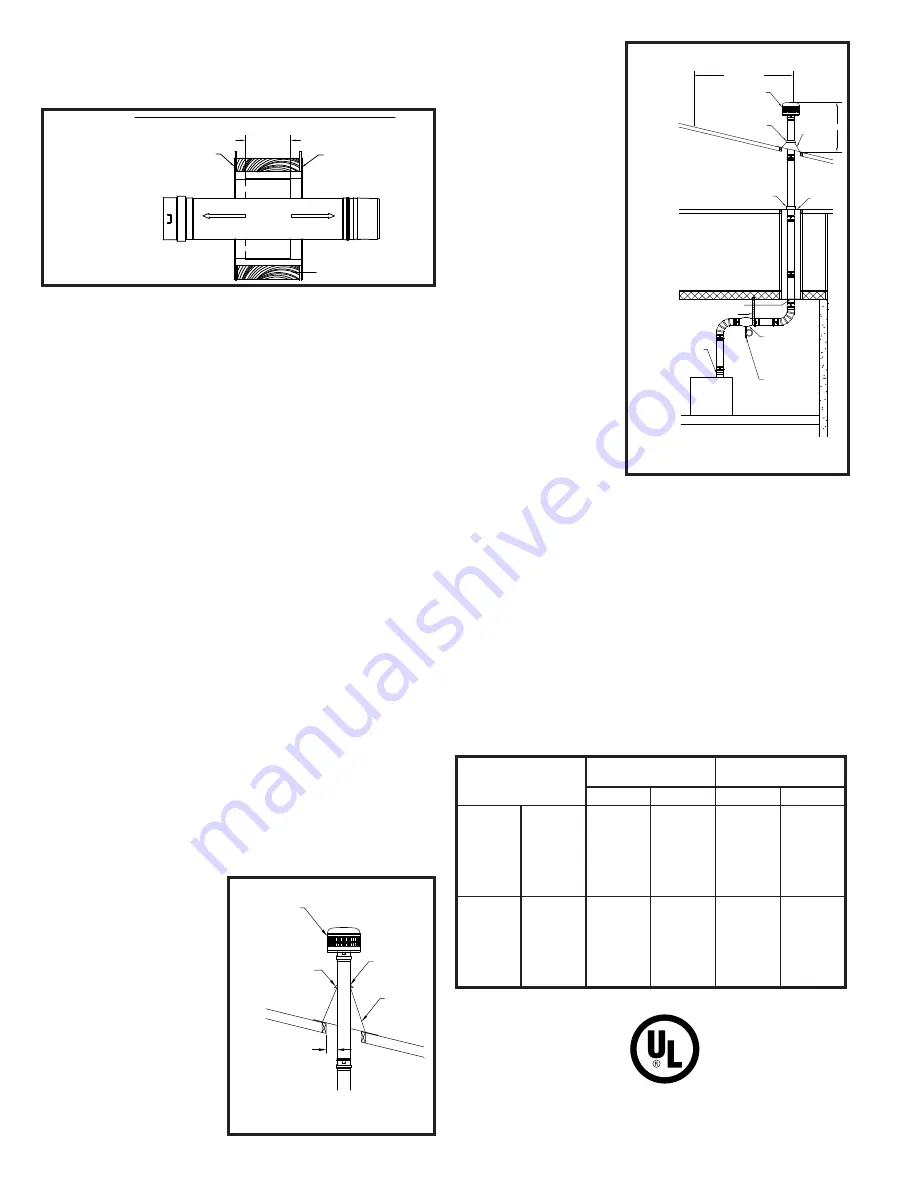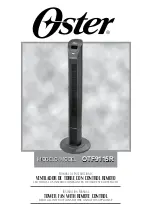
EXTERIOR INSTALLATION
1.
Although it is not
preferred practice, there
may be installations where
Corr/Guard single wall vent
systems run vertically -
exterior to the building and a
wall support(s) is needed. A
wall support is used to secure
the vent system to a wall
while maintaining the
minimum clearance to
combustible construction.
2.
Wall supports must be
securely fastened to a solid
member of the building using
appropriate fasteners for
various building materials
such as wood, steel siding or
masonry.
3.
Wall supports located
exteriorly are to be vertically
spaced no more than 6 feet
(1.8 m) apart.
4. Wall supports are designed
to be fastened to the vent by
means of clamping externally
to the vent. No screws are to
puncture the vent wall.
WARNING: Do not rivet or
screw supports to the vent or
otherwise puncture the vent
wall.
WARNING: Do not place any type of Insulation in any required clearance
spaces surrounding the vent system.
MAINTENANCE
The Corr/Guard vent system should be inspected at least annually for the
presence of deposits or debris and any accumulation should be removed. The
vent system should also be inspected at regular periods for signs of leakage of
condensate or combustible products at any joint.
If the vent system incorporates a drain hose from either an inline fitting or from a
drain tee, the hose must be inspected periodically to assure that water is in the
trap loop. If a proper trap loop in not maintained, exhaust from the connected
appliances may accumulate in the building area.
IMPORTANT: The listing for this product is void if components other than
those supplied as Listed Components by Metal-Fab, Inc. are used. All
warranties, stated or implied, are void if this product and the appliances to
which it is connected are not installed in accordance with their respective
instructions and local code requirements.
TO APPLIANCE
TO TERMINATION
INSIDE BUILDING
SURFACE
OUTSIDE BUILDING
SURFACE
WOOD STUD
2" MIN.
OVERLAP
Wall Thimble
Installation
1. Prior to installation, determine proper location of wall thimble so that a
minimum slope of 1/4” per foot is maintained in the horizontal section of vent
to ensure proper flow of condensation.
2. Prepare the wall by cutting a square opening 5
”
larger than size of the vent
diameter. (Opening size adequate to insert Wall Thimble components)
3. Install the Wall Thimble by inserting the larger of the two parts on the
appliance (interior) side.
4. Next, apply a bead of sealant around the edges of the exterior (smaller of the
two parts) Wall Thimble component. Then install this part of the Wall
Thimble by inserting the smaller collar into the other component from the
previous step.
NOTE: The two horizontal cylinders of the Thimble must engage a mini-
mum of two inches.
5. Fasten both sides of the Wall Thimble using screws or nails.
6. Once the Thimble is installed, Corr/Guard vent pipe can be inserted into the
Thimble by inserting the male end first. (See figure above).
7. Assemble Corr/Guard vent from the Wall Thimble section back to the
appliance.
8. Install a horizontal termination to complete the assembly.
9. Once assembly is completed, apply a bead of high-temp sealant around the
pipe and the exterior plate of the Thimble to protect against weather.
WARNING! Appliance outlet temperature shall not exceed 480
°
F (249
°
C) for
venting systems that penetrate walls constructed of combustible materials.
VERTICAL VENTING
•
Enclose residential exterior vent systems below the roof line or use double
wall Corr/Guard (CG or CGV) to limit condensation due to cool down of flue
gases.
•
Unless installed in a fire rated shaft, a fire stop / vertical support is required
when penetrating floors and ceilings.
•
Vertical supports are to be used after each transition to vertical. The
maximum distance between vertical support plates is 30 feet (9.1 m).
•
When assembling Corr/Guard vent, always align “UP” arrow away from the
appliance.
•
The total equivalent length from the appliance outlet to the termination shall
not exceed that length specified by the appliance manufacturer’s installation
instructions.
•
Vertical terminations must terminate no less than 2’ (0.61 m) above the
roof or any wall or vertical structure closer than 8’ (2.4 m). A vent cap or
other equivalent termination is required to keep rain or debris out of the
vent.
1. Starting at the appliance outlet, attach the first section or appliance
adaptor.
2. Continue assembly of pipe until nearing a ceiling penetration. Locate and
cut hole in floor and ceilings that will be penetrated. Hole size must maintain
minimum listed clearances for single wall Corr/Guard (CGSW or CGVSW).
3. Install a firestop support when penetrating the ceiling to support the vertical
run of the vent system.
4. When installing a firestop in the
attic, the firestop or support
plate is located on top of the joist
to prevent insulation from falling
into the joist.
5.
Continue with the vent
penetrating the roof. At the
roof, the opening must maintain
a minimum of clearance to
combustibles as specified
in these instructions and on he
labeled vent product.
6.
Above the roof, a flashing and
storm collar are required. Use
high temperature sealant to seal
the storm collar to the vent so
that rain will not penetrate the
roof opening.
PITCHED
FLASHING
STORM COLLAR
RAINCAP
SEE CHART FOR
CLEARANCES
HIGH
TEMPERATURE
SEALANT
Roof Installation
APPLIANCE
APPLIANCE ADAPTOR
SEAL AT APPLIANCE
WITH HIGH TEMP. RTV
TO DRAIN
DISPOSE OF
CONDENSATES
ACCORDING TO
LOCAL CODES
HORIZONTAL
DRAIN TEE OR
DRAIN FITTING
WITH TEE
HANGER STRAP
FIRESTOP
SUPPORT CLAMP
FIRESTOP
FLASHING
STORM COLLAR
RAINCAP
10'
SEE NOTE 2
3' MIN.
NOTE 1 - APPLY CAULKING OR
METAL-FAB MST TAPE WHERE
VENT PASSES THROUGH STORM
COLLAR.
NOTE 2 - 3' MINIMUM HEIGHT
ABOVE ANY ROOF SURFACE
WITHIN 10' HORIZONTALLY.
Vertical Installation
Rated Operating
Temperatures
Minimum Clearance
Enclosed
Clearance
Unenclosed
Hor.
Vert.
Hor.
Vert.
3” & 4”
Diameter
400°F
(204°C)
8”
(203mm)
4”
(102mm)
1”
(25mm)
1”
(25mm)
480°F
(249°C)
8”
(203mm)
4”
(102mm)
2”
(51mm)
2”
(51mm)
550°F
(287°C)
N/A
N/A
2”
(51mm)
2”
(51mm)
5”
Diameter
400°F
(204°C)
N/A
6”
(152mm)
1”
(25mm)
1”
(25mm)
480°F
(249°C)
N/A
6”
(152mm)
2”
(51mm)
2”
(51mm)
550°F
(287°C)
N/A
N/A
2”
(51mm)
2”
(51mm)
C
US
LISTED
©2016 Metal-Fab, Inc.
Form No. L2153 - 5/16
9537




















